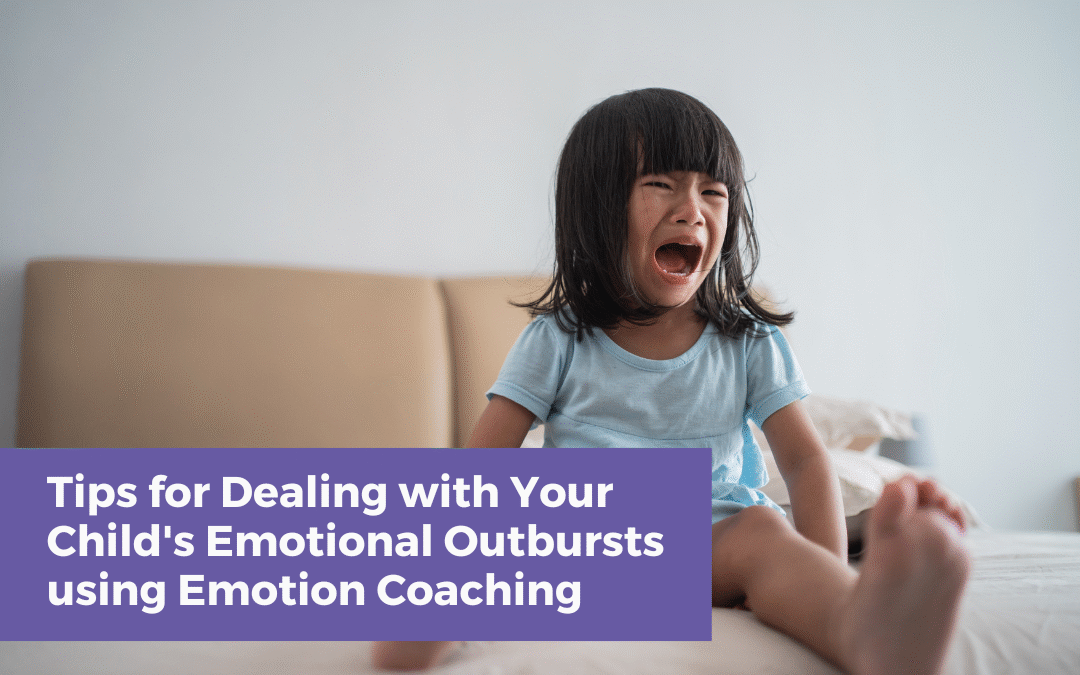Do you find it hard to understand your child’s emotions? Do they suddenly seem to have outbursts for no reason? If this happens, it can be incredibly stressful, and often families don’t know what the right approach is.
One of the questions I often get asked by parents is, how do I support my child when they have outbursts? This is a big question, and there is no one size fits all approach.
What’s emotion coaching?
Research done by John Gottman and his colleagues at the University of Washington, found a link between the meta-emotion philosophy of parents and their parenting styles and their children’s abilities to regulate emotions. The way a parent responds to their child’s emotions has a role in shaping the child’s emotional intelligence. Their research found that parents who used emotion coaching increased the development of emotional intelligence in their child, even in those children with more difficult temperaments.
So what does this mean? Essentially, it means that children of parents who supportively coach them through emotions and are less critical of their child’s emotions, grow up to have greater emotional regulation skills. So how do you do this?
Features of emotion coaching discussed in this article:
- Manage your own emotions and how you respond to them
- Be aware of your child’s emotions, and view displays of emotions as opportunities for teaching and connection
- Helping your child to verbally label the emotion
- Empathise with the emotion
What you do counts.
The first thing I would recommend is looking at how we as adults handle tough times and stress. One of the best things we can do is to model these behaviours ourselves. It’s really hard for a child to understand why it’s not okay to throw a toy or to hit someone if that’s what they see from an adult in their life. This work requires you to look at how you handle stress and situations when you’re angry or sad.
Let’s start with anger. A common emotion that can have negative consequences if not handled well.
What do you do when you’re frustrated or angry?
When you get home from work, annoyed at the traffic or your boss giving you a hard time, do you angrily throw your bag on the floor, or yell at the dog for no reason? Children see this and learn from observing. They can then draw the conclusion that it’s ok to throw things, or yell and have ‘tantrums’ at home.
So the challenge here is how do you manage your emotions in this situation?
To support children to recognise their frustration or anger and learn more helpful ways to manage it, we need to model it ourselves.
You could say:
- I’ve had a really tough day. I’m going to go for a walk.
- I’m feeling overwhelmed. I’m going to have a cup of peppermint tea and sit down for 15 minutes.
- I just need a few minutes to have a shower and get into something more comfortable.
Over time your child will start to learn what they can do in those moments by observing you.
Once we’ve taken some time to observe our own emotions and label them, we can then look at how children show their emotions.
What does this look like?
Let’s say you get home and your kids are fighting and one of them throws a toy at the other. Your first instinct might be to grab them by the hand, pull them aside tell them “don’t do that!’’
If we’re using an emotion coaching framework this looks a little different. At that moment, we are looking at this as an opportunity to connect and educate.
Let’s break down how this might look
You might say “Hey Sam, I can see you’re really frustrated’’ (we labelled the emotion) “What’s going on?’’
They might then tell you their brother didn’t share a toy etc.
Your response might be to empathise with the emotion. “I can see how that would make you feel frustrated, it doesn’t seem very fair.”
This last bit is a key part of emotion coaching, connecting before correcting.
Sit with them for a few moments, chatting about the issue until they’ve settled. Only once they’ve calmed down do you talk about boundaries and expectations. You could say “I understand that it’s not fair and you feel frustrated, but in this house we don’t ever throw toys when we’re annoyed.”
This allows for children to start to recognise their emotions, identify them, and begin to learn how they can handle them. They learn what’s an appropriate response and what’s not (hitting, throwing). Down the track you might find they say “I’m frustrated. My brother took my toy and it’s not fair’’.
Our children are forever watching and everything we do and say has an impact. So if you feel like you need some help with managing your own emotions, as well as theirs, I invite you to try emotion coaching. Your challenge, if you choose to accept it (sorry bad pun) is to notice your emotions first. Notice them, identify them, aim for a calmer reaction and then you can start doing the same for the little ones in your life.
The Connected Teens course gives parents practical tools to support emotional regulation, improve communication and build trust even when things feel tense.
📘 Learn more about Connected Teens: https://marievakakis.com.au/connected-teens/








Recent Comments